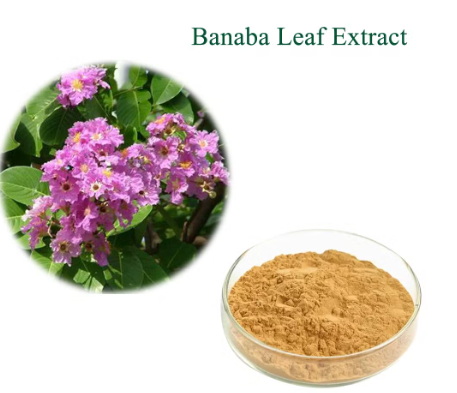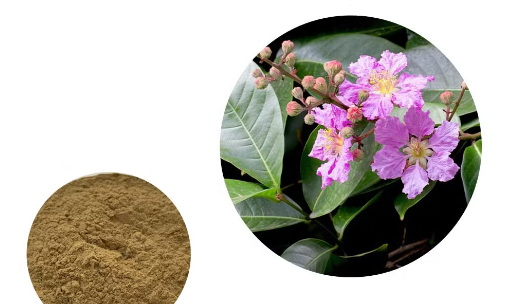Content Menu
● Introduction to Banaba Leaf Extract
● Benefits of Banaba Leaf Extract
● Risks of Excessive Consumption
>> 1. Hypoglycemia (Low Blood Sugar)
>> 2. Gastrointestinal Issues
>> 3. Allergic Reactions
>> 4. Interactions with Medications
>> 5. Pregnancy and Breastfeeding
● Banaba Leaf Extract Dosage
● Safety Precautions
● Potential Long-Term Effects
● Interactions with Other Supplements
● Choosing Quality Banaba Leaf Extract
● Conclusion
● FAQ
>> 1. What is the recommended dosage of banaba leaf extract?
>> 2. Can banaba leaf extract interact with other medications?
>> 3. Is banaba leaf extract safe during pregnancy and breastfeeding?
>> 4. How can I minimize the risk of gastrointestinal side effects from banaba leaf extract?
>> 5. Do I need to monitor my blood sugar levels when taking banaba leaf extract?
● Citations:
Banaba leaf extract, derived from Lagerstroemia speciosa, is widely recognized for its potential health benefits, including lowering blood sugar levels and aiding in weight loss. However, like any supplement, taking too much banaba leaf extract can lead to adverse effects. This article will explore the risks of excessive consumption, discuss appropriate dosages, and provide guidance on safe usage.

Introduction to Banaba Leaf Extract
Banaba leaves have been used in traditional medicine for centuries, particularly in Southeast Asia, to manage diabetes and other health conditions. The extract contains bioactive compounds such as corosolic acid, which is believed to contribute to its therapeutic effects.
Benefits of Banaba Leaf Extract
Before discussing the risks of excessive consumption, it's essential to understand the benefits of banaba leaf extract:
1. Blood Sugar Control: Banaba leaf extract is known for its ability to lower blood sugar levels by enhancing insulin sensitivity and glucose uptake in cells.
2. Weight Loss: It may aid in weight loss by suppressing fat synthesis and increasing fat metabolism.
3. Cholesterol Reduction: Banaba extract can help reduce triglycerides and increase HDL (good) cholesterol levels.
4. Antioxidant Properties: Banaba leaf extract contains antioxidants that can help protect against oxidative stress and inflammation.
5. Cardiovascular Health: It may also contribute to improved cardiovascular health by reducing inflammation and improving lipid profiles.
Risks of Excessive Consumption
Taking too much banaba leaf extract can lead to several adverse effects:
1. Hypoglycemia (Low Blood Sugar)
One of the most significant risks is hypoglycemia, particularly for individuals already taking diabetes medications. Symptoms include dizziness, sweating, confusion, and fainting.
2. Gastrointestinal Issues
High doses of banaba leaf extract may cause gastrointestinal discomfort, including nausea, diarrhea, and stomach cramps.
3. Allergic Reactions
Some individuals may experience allergic reactions, such as skin rashes, itching, or swelling. If these occur, discontinue use and consult a healthcare provider.
4. Interactions with Medications
Banaba leaf extract can interact with certain medications, such as diabetes drugs and blood pressure medications, potentially leading to adverse effects like hypoglycemia or hypotension.
5. Pregnancy and Breastfeeding
There is insufficient data on the safety of banaba leaf extract during pregnancy and breastfeeding, so it is recommended to avoid its use in these conditions.

Banaba Leaf Extract Dosage
The appropriate dosage of banaba leaf extract depends on several factors, including age, health status, and the specific condition being treated. General guidelines for dosage include:
- For Blood Sugar Regulation: The typical dose for blood sugar control is 32-48 mg of corosolic acid daily, often divided into two or three doses taken before meals.
- For Weight Management: A dose of 8-12 mg of corosolic acid taken once or twice daily is common.
- Herbal Tea: For those who prefer tea, 1-2 grams of dried Banaba leaves can be steeped in hot water for 5-10 minutes, consumed 1-2 times daily.
Safety Precautions
To minimize the risk of adverse effects, follow these safety precautions:
- Consult a Healthcare Provider: Especially if you have diabetes, are pregnant, or breastfeeding.
- Start with Low Doses: Gradually increase the dose to minimize gastrointestinal issues.
- Monitor Blood Sugar: Regularly check blood sugar levels if you are diabetic.
- Avoid Overuse: Do not exceed the recommended dosage to prevent adverse effects.
Potential Long-Term Effects
While short-term side effects are well-documented, there is limited research on the long-term effects of banaba leaf extract. However, prolonged use may lead to:
- Dependence on the Extract: Some users might rely heavily on the extract for blood sugar control, which could complicate management if they stop using it.
- Nutrient Deficiencies: High doses over extended periods might interfere with nutrient absorption.
Interactions with Other Supplements
Banaba leaf extract can also interact with other supplements, such as:
- Chromium and Magnesium: These minerals are often used for blood sugar control and may enhance the effects of banaba leaf extract.
- Green Tea Extract: Combining with green tea extract might increase the risk of gastrointestinal side effects due to their synergistic effects on metabolism.
Choosing Quality Banaba Leaf Extract
When selecting a banaba leaf extract product, consider the following:
- Look for Standardization: Ensure the product is standardized to contain a specific amount of corosolic acid.
- Check Manufacturer Reputation: Choose products from reputable manufacturers that adhere to good manufacturing practices (GMPs).
- Read Reviews: Consider feedback from other users to gauge effectiveness and potential side effects.
Conclusion
Banaba leaf extract offers several health benefits but can also cause adverse effects if taken in excess. It is crucial to be aware of these potential risks and take necessary precautions to ensure safe use. Always consult with a healthcare provider before starting any new supplement regimen.

FAQ
1. What is the recommended dosage of banaba leaf extract?
The recommended dosage for blood sugar regulation is typically 32-48 mg of corosolic acid daily, while for weight management, it is 8-12 mg once or twice daily.
2. Can banaba leaf extract interact with other medications?
Yes, banaba leaf extract can interact with diabetes medications and blood pressure medications, potentially leading to hypoglycemia or hypotension.
3. Is banaba leaf extract safe during pregnancy and breastfeeding?
There is insufficient data on the safety of banaba leaf extract during pregnancy and breastfeeding, so it is recommended to avoid its use in these conditions.
4. How can I minimize the risk of gastrointestinal side effects from banaba leaf extract?
To minimize gastrointestinal side effects, start with a low dose and gradually increase it as needed.
5. Do I need to monitor my blood sugar levels when taking banaba leaf extract?
Yes, especially if you are diabetic, as banaba leaf extract can lower blood sugar levels and increase the risk of hypoglycemia when combined with other diabetes medications.
Citations:
[1] https://naturmedscientific.com/banaba-leaf/
[2] https://pmc.ncbi.nlm.nih.gov/articles/PMC5067667/
[3] https://downloads.regulations.gov/FDA-2014-S-0023-0070/attachment_1.pdf
[4] https://www.healthline.com/nutrition/banaba-leaf
[5] https://www.rxlist.com/supplements/banaba.htm
[6] https://www.drugs.com/npp/banaba.html
[7] https://www.kroger.com/p/vitacost-banaba-leaf-extract-capsules-300mg/0083500300824
[8] https://www.webmd.com/vitamins/ai/ingredientmono-1089/banaba
[9] https://pmc.ncbi.nlm.nih.gov/articles/PMC3468018/






























